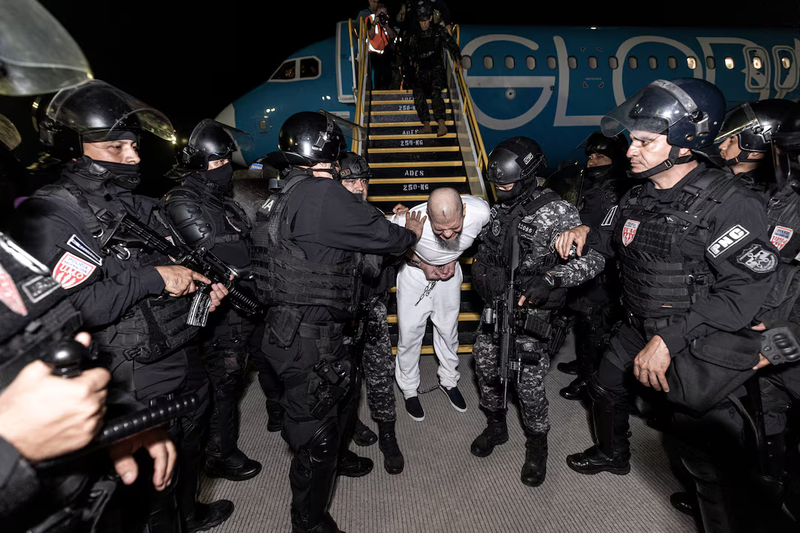The U.S. government has deported over 200 alleged members of the Venezuelan criminal gang Tren de Aragua to El Salvador, where they have been transferred to a high-security prison. The move, authorized by President Donald Trump under the 1798 Alien Enemies Act, has sparked legal and international controversy, with a federal judge temporarily blocking further deportations.
Salvadoran President Nayib Bukele confirmed the arrival of 238 alleged gang members in his country, stating they would be detained at the Terrorism Confinement Center, a massive prison facility that can hold up to 40,000 inmates. Bukele’s administration has positioned itself as a stronghold against organized crime, yet the decision to accept these deportees has raised concerns about regional security, international law, and human rights violations.

The Tren de Aragua gang has been linked to serious crimes, including kidnapping, extortion, and contract killings, operating across multiple Latin American countries. The swift deportations were ordered without standard U.S. immigration court proceedings, using the Alien Enemies Act, which has historically been used to justify internment camps during World War II. Critics argue that applying this law to migrants, especially without due process, sets a dangerous precedent that could be exploited for political purposes.
Despite the federal judge’s temporary block on further deportations, it appears the initial flights had already departed before the ruling. In a post on social media, Bukele mockingly responded to the U.S. court’s decision, writing, “Oopsie… too late.” U.S. Secretary of State Marco Rubio also confirmed that, in addition to the Venezuelan gang members, 23 members of the Salvadoran gang MS-13 were also deported to El Salvador.
The Associated Press reported that the U.S. government agreed to pay El Salvador $6 million to detain 300 suspected gang members for one year. The Trump administration has since filed an appeal against the federal court’s decision, aiming to continue the expedited deportations.
Venezuela’s government has strongly condemned the move, calling it a violation of migrants’ rights and criticizing the U.S. for using outdated legal frameworks to justify mass deportations. Meanwhile, human rights organizations have raised alarms over the treatment of deportees in El Salvador’s prison system, which has been accused of severe human rights abuses under Bukele’s administration.
Amidst this growing geopolitical turmoil, U.S. policymakers are also facing concerns over China’s increasing influence in Latin America. Experts warn that while Washington focuses on domestic immigration policies and gang-related issues, Beijing is rapidly expanding its economic and strategic footprint in the region. China’s investments in infrastructure, energy, and trade agreements with Venezuela, El Salvador, and other Latin American nations could undermine U.S. interests. With China strengthening alliances in the Western Hemisphere, there are fears that Washington is losing its traditional dominance in the region. If the U.S. does not address this power shift soon, it could find itself strategically outmaneuvered by Beijing in a critical area close to home, jeopardizing its long-term economic and national security interests significantly. The consequences of inaction could be irreversible, with lasting implications for American global leadership.